Barts Health and NEL NHS Trust COVID-19 bereavement survey: results

Barts Health, in partnership with NEL CSU, undertook a telephone survey with relatives who were bereaved during the Covid-19 Pandemic. This followed suspension of all routine feedback to the trust, including the routine bereavement questionnaire, making it impossible to understand the impact of changes to the trusts’ approach to working with bereaved families.
Following the government instructions in March to stay at home, no visitors were permitted to visit any of the hospital sites except in exceptional circumstances. It was recognised that it was particularly traumatic when relatives were not able to visit patients prior to death resulting in implications for the bereavement process.
Anecdotal conversations with the bereavement services suggested that many families were struggling with the changes, and this was adversely affecting their experience during a significant life event.
The telephone survey questionnaire was developed to evaluate several specific issues, which formed the thematic areas of the survey:
- Lack of visiting
- Difficulties with communication and receiving information from staff
- Not being able to view their relative after death
- Use of Chaplaincy and spiritual care services
- Collection of and missing property.
Methodology
Experienced staff familiar with conducting difficult and complex conversations were recruited from several trust departments including complaints, bereavement, organ donation, and the corporate Macmillan Team to undertake the telephone interviews no earlier than three to four weeks after the death.
All the interviews were completed by July 2020 and analytical support was provided by NEL CSU.
Survey findings
A total of 135 telephone calls were made during May, June, and July across the four Trust sites. Of those who completed a telephone survey, 51% were Covid-related deaths, and 43% non-Covid deaths, and overall 44% of those surveyed were from BAME backgrounds.
Overall there were more positive comments than negative comments from bereaved relatives. In terms of overall feedback, 74% of the relatives of patients with a non-Covid death reported being happy with the overall experience and communication about care and treatment, while only 52% of the relatives of patients with Covid deaths had positive feedback. Royal London and Newham which had greater numbers of Covid patients had more negative feedback.
The survey also highlighted the difference in feedback from families from a BAME background, with more negative feedback experienced from BAME individuals, issues with virtual visiting, access to spiritual care and issues with missing patient property. The findings are now being disseminated and discussed by the Trust and recommendations are likely to be in the following areas:
- All staff to record next of kin for all patients
- Development of communication skills training
- Establishing use of ipads to enable virtual visiting
- Ensure that the needs of bereaved families from a BAME background are considered by all staff.
- Promotion of the role of chaplaincy and spiritual care.
- Review current process for patient property to ensure families receive belongings in a timely way.
- Review the current postal bereavement survey and consider how best to continue to receive feedback
For further information please contact: Alison Hill, Director of Cancer and Palliative Care Nursing, Barts Health Alison.hill8@nhs.net
